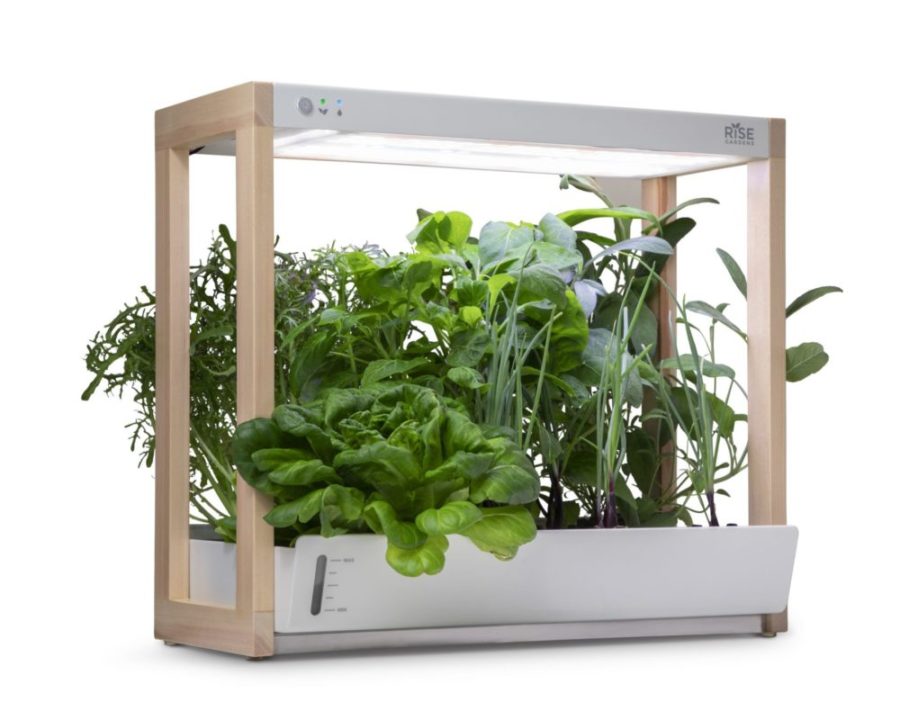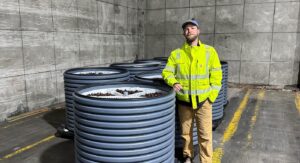Alexa can help you do a lot of things, from making a reservation to keeping your grocery list up to date and vacuuming your house. But what if the Amazon voice assistant could also help you to grow lettuce and other vegetables at home? For Rise Gardens founder and CEO Hank Adams, that’s exactly the plan. Or at least, plan B.
Before launching the Skokie, Illinois-based startup, he dabbled in the indoor farming arena and had every intention of throwing his hat in the ring alongside the likes of Plenty, Bowery, and Gotham Greens. He even constructed a test-case greenhouse in Skokie to learn more about the process.
“I ultimately decided I wasn’t crazy about the economics of it, because it’s expensive and you see these companies raising $300 and $400 million raises. Plenty did a billion-dollar deal with SoftBank. I thought, ‘Boy, I don’t want to be on that path of having to raise massive amounts of money and hope scale comes,’” Adams tells AFN.
Adams sees value and opportunity for large-scale indoor farming startups that are raking in massive fundings and going public through SPAC deals. But he highlights a facet of the process that so many people outside the startup world never see.
“Indoor farming will get there eventually, but it’s going to take time, a lot of money, and the current crop of startups may not be the group that gets there. I know what it’s like to struggle under a cap table that’s had to raise a lot of money. It gets really hard,” he says.
Rise Gardens recently announced the close of a $9 million Series A round led by Telus Ventures, the VC arm of Canadian telecom giant Telus, which discovered the startup during the virtual 2020 Consumer Electronics Show. Also participating in the round were existing investors Amazon Alexa Fund and True Ventures, alongside new investor Listen Ventures.
Founded in 2017, the startup claims it offers the only modular in-home hydroponic farming system that allows consumers to choose between one, two, or three levels of growing. It also touts itself as the only offering to let users grow multiple plant types simultaneously including greens, herbs, tomatoes, microgreens, vining crops, and rooted veggies.
Flexibility is one of the primary ways that Rise Gardens hopes to differentiate itself from other in-home growing units like those offered by AeroGarden, AeroGrow International, and Click & Grow.
Users need to add water and nutrients to their units once a week and perform a deep cleaning every six months, according to Rise Gardens’ instructions. Built-in sensors allow its units to maintain the water, nutrients, and light at optimum levels. Users can monitor and control the units by downloading a mobile app or giving voice commands to Alexa.
And while many in-home systems are constructed out of plastic, Rise Gardens’ are made from heavy-gauge steel and solid wood.
“It looks like a piece of furniture. It’s really well built and I think the Alexa team liked that aspect,” Adams says. “It felt like a real appliance, not like a novelty.”
The starting price for Rise Gardens’ Family Garden bundle is $549, while its smaller ‘countertop garden’ runs at $280. You’ll also need to order supplies to maintain your garden, which can be purchased a la carte or through a $20-per-month subscription.
In part, Rise Gardens’ success depends on reaching the right type of consumer. Not everyone can afford an in-home garden – nor do they have the time to tend to it. So far, Adams sees his core customers as people who are really committed to growing their own food and cooking with it, or people who want to teach their kids about food production.
“That said, we’ve actually found a really wide distribution. We’ve sold in every state in the US and Canada and have sold lots of gardens to rural areas,” he says.
“We’ve sold to the suburbs and a fair chunk even in the big city. So, it really doesn’t break down neatly by demographics like you might think. We really have a pretty wide distribution of customers. More so than I expected, honestly.”





